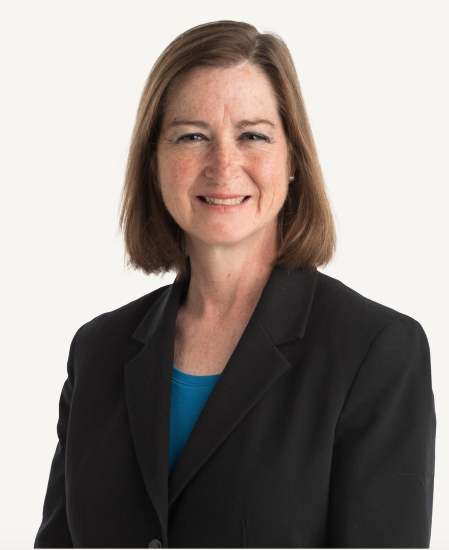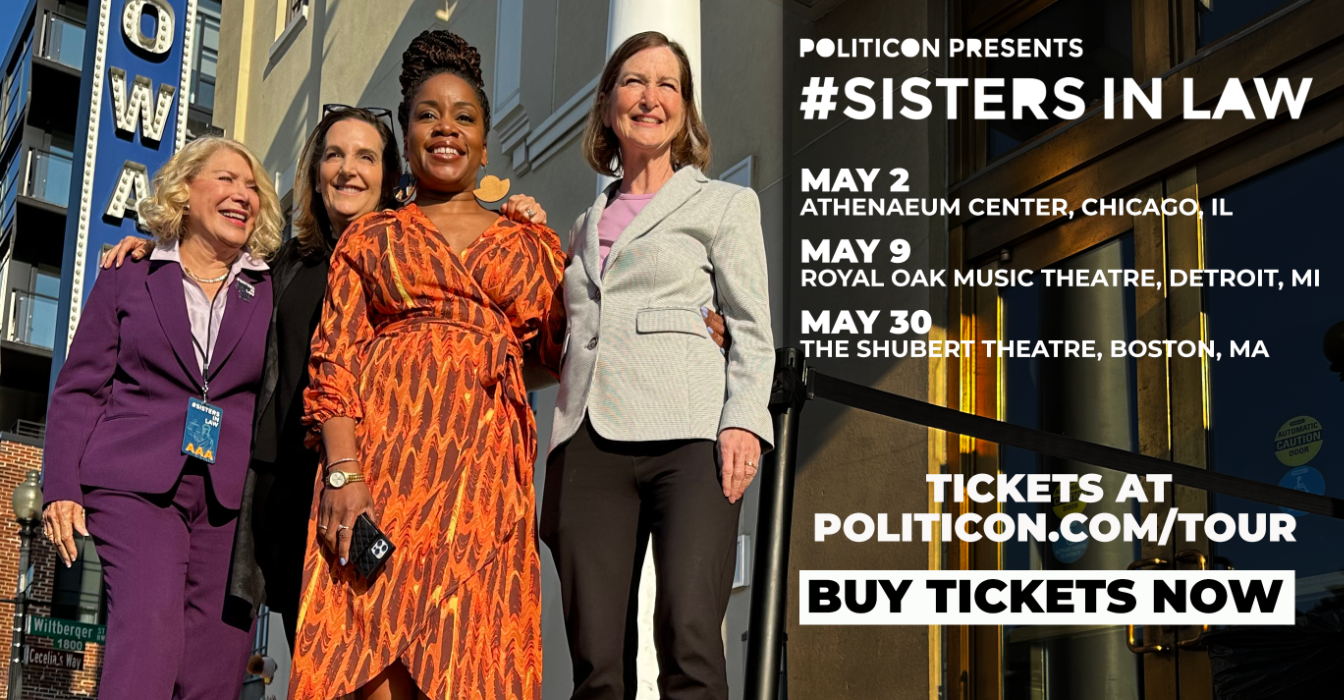The former prosecutor is taking the stage with her co-hosts to discuss disinformation campaigns and other pressing legal issues shaping culture and politics today.
The popular legal podcast #SistersInLaw is going on tour next month, with dates in Chicago, Detroit and Boston. The roundtable-style podcast is hosted by legal luminaries Joyce Vance, Jill Wine-Banks, Barb McQuade and Kimberly Atkins Stohr.
We caught up McQuade ahead of the tour for her thoughts on some of the closest-watched legal issues ahead of this year’s election, including the disinformation campaigns that are increasingly shaping the cultural and political life of this country.
McQuade served as a prosecutor in the Eastern District of Michigan and, before that, an Assistant U.S. Attorney in Detroit for over a decade. She is currently Professor from Practice at the University of Michigan Law School. Her recent book, “Attack from Within: How Disinformation is Sabotaging America,” is a New York Times bestseller.
Tour dates are below. Click here for tickets!
#SistersInLaw Live Tour:
- May 2: Chicago, Ill., at the Athenaeum Center
- May 9: Detroit, Mich., at the Royal Oak Music Theatre
- May 30: Boston, Mass., at the Shubert Theatre
Lawdragon: Tell us about the #SistersInLaw Podcast. Whose idea was it or how did it come about?
Barb McQuade: Politicon reached out to each of us. All of us are MSNBC legal analysts and they asked if we'd be interested in doing a podcast that would enable us to do a deeper dive than we get a chance to do on cable TV. And I think we were all eager to give that a try, so it's worked out very well.
LD: Did you know Joyce, Kimberly and Jill beforehand? Or how did the foursome come together?
BM: We were all acquainted in one way or another. I knew Joyce very well because we were U.S. attorneys together during the Obama administration. We did a lot of work together, so I knew her very well. I had met Kim at a panel discussion, and I had met Jill at an event, but I certainly knew of them from our mutual appearances on MSNBC. I admired them and their work.
LD: Could you give us an overview of your book, “Attack from Within,” and your inspiration for writing it?

BM: I spent most of my career as a national security prosecutor and still consider myself to be that at my core. I teach a class in national security law at Michigan Law School, and I have been teaching excerpts from the Mueller Report since 2018 relating to Russian disinformation. So I've taken a real interest in that area, and I've been doing a lot of reading in that area since that time. And it seemed to me that disinformation from within the United States is now the biggest national security threat facing our country. So I wanted to write a book that would expose the tactics so that people could identify them and name them, and that by being educated, we could build resilience against them.
LD: Was Trump’s election the first time we started seeing these big misinformation campaigns?
BM: I think it's a combination of the use of social media efforts by Russia to sow discord in American society and the 2016 presidential election. All of those things converged right about that time.
LD: Russia, and China, right?
BM: Yes and Iran, North Korea. But my focus of my book is really about disinformation used by us on us. Tactics and efforts like Stop the Steal, and Covid-19 efforts to deceive people to advance one's own political or financial agenda through the use of disinformation.
LD: How is this all playing into this year's election?
BM: I'm sure we are going to see lots of efforts to confuse voters about voting processes, but at the moment, where we're really seeing it is Donald Trump's efforts to suggest that the criminal prosecutions against him are election interference. He's been charged in three different jurisdictions, the state of Georgia, the state of New York, and in federal court. In federal court, there's a special counsel who has charged him and of course, the state courts have nothing to do with Joe Biden. Nonetheless, Donald Trump consistently repeats the claim that the prosecutors are controlled by Joe Biden, and it's all about election interference. He is even accusing the judges in those cases of engaging in election interference, so I think that is part of the effort to undermine the credibility of those prosecutions.
As the election approaches, it is likely to find additional disinformation like the kind that we saw in 2016 with efforts to confuse people about voting rules. We may even see artificial intelligence creating fake robocalls the way we did with Joe Biden in New Hampshire in the primary when there was a recording of a voice that sounded like Joe Biden urging voters to stay home from the polls. So I imagine we'll be seeing more of that as the election approaches.
LD: Do you anticipate Russia to be as involved in this election as they were in 2016?
BM: Yes, I think so. We're already seeing Russian involvement. The Biden administration recently sanctioned a couple of Russian groups for the disinformation that they have been spouting. There's a group called Doppelganger that has been very active in the war between Russia and Ukraine. And I think that we can expect more activity within the United States as the election approaches from Russian sources. Information warfare is cheap and it's easy, it's relatively safe and it's very effective.
LD: Can you talk more about how the advances in AI are ratcheting up the ability to spread misinformation?
BM: People can create fake videos, called deep fakes. They can create fake audio recordings that look and sound like a person's doing or saying things that they never did. There is the ability to use a celebrity’s likeness to push a particular claim. The Doppelganger group is using celebrities like Taylor Swift and Beyonce and Cristiano Ronaldo, the soccer superstar, to make statements undermining Volodymyr Zelenskyy in Ukraine.
I expect we will see more of this as the election approaches. I could also imagine the generation of robocalls or messages telling people that unless you registered to vote by X date, you are not eligible to vote. Or other false information, such as, your polling place is closed tomorrow and you should go on Wednesday instead, or you can vote by text this time. I can imagine lots of different authentic-looking messages that are communicated online or by phone that are designed to suppress voter turnout.
LD: How about abortion access? How do you think the struggle there has been affected by disinformation?
BM: I've been reading reports about influencers online targeting young women, 18 to 24, telling them that birth control pills are dangerous or will make you gain weight or that they're ineffective. These are influencers who normally focus on makeup and fashion. And I think that young women who are susceptible to that influence could very well fall prey to it. This isn’t about abortion per se, but contraception, and an effort to confuse and deceive people about that.
LD: Does it look like these influencers are being paid or in some way asked to make those statements?
Disinformation from within the United States is now the biggest national security threat facing our country. So I wanted to write a book that would expose those tactics.
BM: We don't know. We don't know who's behind it or who's pushing it, but it seems to be a coordinated effort. And it seems that there's a great deal of it.
LD: What Supreme Court rulings are you keeping your eye on right now?
BM: There's the Mifepristone case out of Texas, certainly keeping an eye on that one. There is a case that was being argued last week called Fischer that relates to whether the obstruction of justice statute can be used against January 6th attackers. I think that will be very interesting. Then there are cases relating to border security where Texas wants to be able to police its own border in an area, while of course immigration law is one that is typically reserved for the federal government. And then of course, there's the Trump immunity case that will be argued on April 25th.
LD: What do you enjoy about doing this podcast and working with these extraordinary women?
BM: It's been a great opportunity. I see it as an extension of my work as a teacher, an opportunity to help people understand what could be complicated issues in the law, and explain that in a way that is understandable to non-lawyers. That part I find very gratifying. I also really am fond of the other three hosts. They're smart and witty, and I so look forward to our conversations every Friday afternoon about the week in the law and maybe looking ahead to the week to come. In some ways, it's an opportunity to vent, but in other ways it's an opportunity to share perspectives. And sometimes they make me think about things in a slightly different way.
We also have some laughs along the way, so I really enjoy talking with them. I talk with a lot of people who tell me that they listen to #SistersInLaw on Saturday morning, either with their morning coffee or while they're walking their dog or doing their chores around the house, and they feel like they're spending their Saturday morning with us having a chat about the law. It makes me really happy to hear, because that's the goal, to try to break it down like we're having an ordinary conversation about legal issues in the news that are significant.
LD: We always like to ask: What made you first want to become a lawyer?
BM: Watergate. As a child, I watched the Watergate hearings and I was appalled that a person in a position of such power and influence, like the President of the United States, would abuse his power. And I was impressed with the lawyers who were able to ask questions and expose that misconduct. So, that has always attracted me to the law. It's why I stand in awe of Jill Wine-Banks, who was a Watergate prosecutor.
LD: You have such a dynamic legal career. Is this the sort of career that you imagined when you were back in law school?
BM: Oh, never. My only goal in law school was I thought I wanted to be a litigator in one way or the other. It’s probably no surprise that I was drawn to prosecution. I started as a law clerk and then in a large law firm. Opportunities arise as life goes on, so I find myself here now and just thrilled with the opportunities that I have.
LD: Do you ever think about becoming a politician?
BM: No. I think I am too selfish to do that. I am very grateful for the sacrifices that people make to serve, but in light of the severe intrusions on privacy and risk to public safety, I don't want to expose my family to those things.


